

ASPIRES Home Page.
Asperger's stress hormone 'link' Children with Asperger's Syndrome may dislike change to their routine because of their different levels of the stress hormone cortisol, a study suggests.

The hormone is believed to make the brain more alert, and more able to cope with changes in the environment. Writing in Psychoneuroendocrinology, researchers noted children with the autistic condition do not experience the normal morning "surge" of cortisol. This may explain their need for routine and aversion to change, they suggested. Neuropsychopharmacology - Oxytocin Infusion Reduces Repetitive Behaviors in Adults with Autistic and Asperger's Disorders. 'Trust Hormone' May Improve Autism. A dose of the "trust hormone" oxytocin may help bring some autistic people out of their shell.
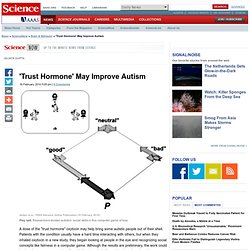
Patients with the condition usually have a hard time interacting with others, but when they inhaled oxytocin in a new study, they began looking at people in the eye and recognizing social concepts like fairness in a computer game. Although the results are preliminary, the work could lead to drugs to treat a variety of social disorders, including schizophrenia and anxiety, says expert Evdokia Anagnostou, a child neurologist at the Bloorview Research Institute in Toronto, Canada. Social skills for adolescents and adults. Social Skills and Autism - Autism and Social Skills Training. Why Would a Person With Autism Need to See a Social Skills Therapist?
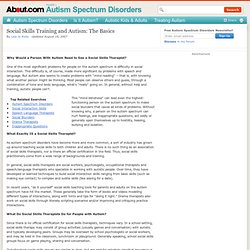
One of the most significant problems for people on the autism spectrum is difficulty in social interaction. This difficulty is, of course, made more significant by problems with speech and language. But autism also seems to create problems with "mind reading" -- that is, with knowing what another person might be thinking. Most people can observe others and guess, through a combination of tone and body language, what's "really" going on. In general, without help and training, autistic people can't. This "mind blindness" can lead even the highest-functioning person on the autism spectrum to make social blunders that cause all kinds of problems. Ways Adults With Asperger's Syndrome Can Improve Their Social Skills. I've read quite a bit about Asperger's Syndrome, in books and academic articles, but also through a ton of forum posts by people who have it.
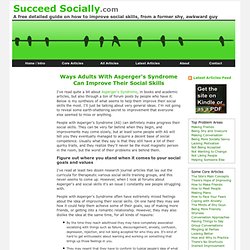
Below is my synthesis of what seems to help them improve their social skills the most. I'll just be talking about very general ideas. I'm not going to reveal some earth-shattering secret to improvement that everyone else seemed to miss or anything. Austin Behavioral Health Center - Specializations: Assessment. The most appropriate assessment for any patient is one that is tailored to the individual.
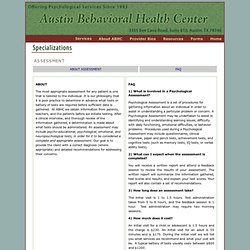
It is our philosophy that it is poor practice to determine in advance what tests or battery of tests are required before sufficient data is gathered. At ABHC we obtain information from parents, teachers, and the patients before we initiate testing. After a clinical interview, and thorough review of the information gathered, a determination is made about what tests should be administered. An assessment may include psycho-educational, psychological, emotional, and neuropsychological tests, in order for it to be considered a complete and appropriate assessment.
Our goal is to provide the client with a correct diagnosis (where appropriate) and detailed recommendations for addressing their concerns. 1) What is involved in a Psychological Assessment? 2) What can I expect when the assessment is completed? 3) How long does an assessment take? The initial visit is 1 to 1.5 hours. 4) How much does it cost? Austin Behavioral Health Center - Specializations: Asperger's & Autism Specturm. There are an increasing number of children coming into our practice with overlapping conditions.
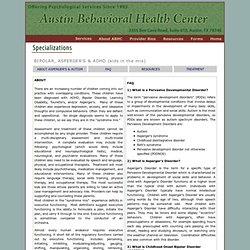
These children have been diagnosed with ADHD, Bipolar Disorder, Learning Disability, Tourette’s, and/or Asperger’s. Many of these children also experience depression, anxiety, and obsessive thoughts and compulsive behaviors. Often they are defiant and oppositional. No single diagnosis seems to apply to these children, so we say they are in the “syndrome mix.”
Assessment and treatment of these children cannot be accomplished by any single provider. Most children in the “syndrome mix” experience deficits in executive functioning. Applied Behavior Analysis (ABA) Applied behavior analysis. Applied behavior analysis (ABA), previously known as behavior modification,[1] is the application of operant and classical conditioning that modifies human behaviors, especially as part of a learning or treatment process.
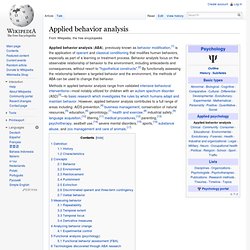
Behavior analysts focus on the observable relationship of behavior to the environment, including antecedents and consequences, without resort to "hypothetical constructs".[2] By functionally assessing the relationship between a targeted behavior and the environment, the methods of ABA can be used to change that behavior. Methods in applied behavior analysis range from validated intensive behavioral interventions—most notably utilized for children with an autism spectrum disorder (ASD)[3]—to basic research which investigates the rules by which humans adapt and maintain behavior. Definition[edit] History[edit] B.F. Although deriving from a similar philosophy, behavior modification was one form of behaviorism that modified behavior without addressing what was causing it.